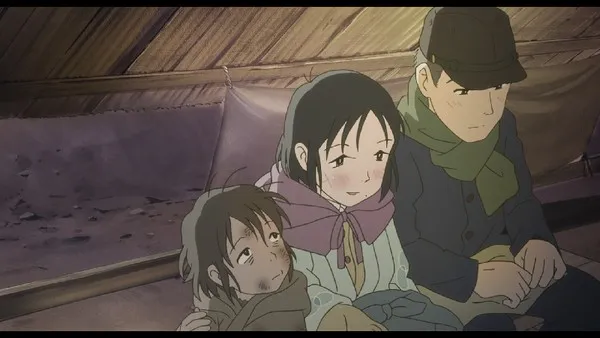Table of Contents
- Gender Roles and the Domestic Sphere
- The Impact of War on Civilian Life
- Memory, Trauma, and Collective Identity
- The Role of Art and Imagination
- Social Change and Historical Context
- Conclusion
“In This Corner of the World” is a critically acclaimed Japanese anime film set against the backdrop of World War II, providing a nuanced exploration of the human experience during wartime. The story follows Suzu Urano, a young woman who moves to Kure, near Hiroshima, after marrying into a new family. Her journey from innocence to resilience highlights the profound sociological themes embedded in the film, including gender roles, the impact of war on civilians, memory and trauma, social solidarity, and the intersection of individual and collective experiences. This article will analyze these sociological dimensions, exploring how they reflect broader societal issues and human resilience during periods of crisis.
Gender Roles and the Domestic Sphere
A major theme in “In This Corner of the World” is the exploration of traditional gender roles in 1940s Japan, a period when societal expectations around men and women were highly rigid. Suzu, the film’s protagonist, provides a lens through which we can examine the intersection of gender and social expectations, as her life is shaped by the domestic sphere and the gendered division of labor.
Gender and Domesticity
In Japanese society during the wartime period, gender roles were highly stratified, with women confined to the domestic sphere. Suzu’s life revolves around household duties such as cooking, cleaning, and maintaining the family’s well-being, even in the face of wartime scarcity. This traditional role reflects the patriarchal structure of society, where women were expected to be the emotional and physical caretakers of the home, while men were involved in public life or, in this case, war efforts.
The film demonstrates how Suzu’s identity is largely defined by her role as a wife and daughter-in-law, which is typical of gender norms in pre-war and wartime Japan. Her obedience to these roles exemplifies the sociological concept of gender socialization, where individuals internalize the expectations of their gender from a young age. Suzu’s compliance with her assigned role reflects the pressure to conform to societal expectations, even in the face of adversity.
Gender and Resilience
Despite the traditional gender roles, “In This Corner of the World” also showcases women’s resilience and strength. Suzu, while constrained by societal expectations, adapts to the harsh realities of wartime life with remarkable fortitude. Her ability to manage the household under extreme conditions—such as food rationing, the loss of loved ones, and the constant threat of bombings—demonstrates her inner strength. This resilience aligns with feminist sociology, which argues that women’s contributions to society, particularly in times of crisis, are often overlooked or undervalued.
Through Suzu’s experience, the film highlights the double burden many women face: maintaining domestic responsibilities while dealing with the added pressures of wartime survival. This double burden becomes a significant source of strain but also a means of showcasing women’s critical role in sustaining family and community life during times of upheaval.
The Impact of War on Civilian Life
The film vividly portrays the devastating impact of war on civilian life, a key theme in sociological analyses of conflict and social disruption. Unlike many war films that focus on the battlefield, “In This Corner of the World” emphasizes the experiences of those who are far from the frontlines but still deeply affected by the consequences of war. The anime provides a unique sociological perspective on how macro-level conflicts reshape the micro-level experiences of everyday life.
Social Disruption and Scarcity
One of the key social challenges portrayed in the film is the scarcity of resources due to wartime conditions. Food rationing becomes a daily struggle for Suzu and her family, and the film illustrates how communities must adapt to these harsh realities. This scarcity represents the broader societal impact of war on the economy and living conditions, often leading to social strain as individuals and families struggle to meet basic needs.
The sociological concept of social strain theory, developed by Robert Merton, explains how individuals adapt to societal pressures when legitimate means of achieving success are blocked. In the case of wartime Japan, food scarcity and rationing represent a systemic failure to meet citizens’ basic needs, leading to adaptive strategies such as bartering, foraging, or even stealing to survive.
Civilian Resilience and Social Solidarity
While the war brings devastation and hardship, it also fosters a sense of social solidarity, as depicted through the communal efforts to support one another. Neighbors come together to share what little they have, creating a sense of mutual aid in times of crisis. This collective spirit is emblematic of Emile Durkheim’s concept of mechanical solidarity, where individuals in pre-modern or closely-knit societies band together in the face of external threats to ensure the survival of the group.
The film illustrates how, despite the hardships, the community exhibits resilience by relying on social bonds to cope with the challenges of war. These bonds, rooted in shared experiences and mutual dependence, become a source of emotional and practical support. The depiction of community life in the film resonates with broader sociological discussions on how societies adapt to crisis and disaster, reinforcing the idea that social cohesion is often strengthened in the face of external threats.
Memory, Trauma, and Collective Identity
Get the full article AD FREE. Join now for full access to all premium articles.
View Plans & Subscribe Already a member? Log in.





